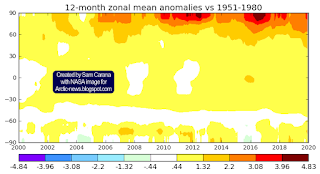Temperatures keep rising. Above image uses NASA data that are adjusted to reflect a 1750 baseline, ocean air temperatures and higher polar anomalies, while showing anomalies going back to September 2011, adding a blue trend going back to 1880 and a red trend going back to September 2011.
The map below also shows that in November 2020, especially the Arctic Ocean, again was very hot.

Anomalies in the above NASA image are compared to 1951-1980, while NOAA's default baseline for temperature anomalies is the 20th century average. In the Copernicus image below anomalies are compared to the 1981-2010 average.
Using a different baseline can make a lot of difference. An earlier analysis pointed out that, when using a 1750 baseline and when using ocean air temperatures and higher Arctic anomalies, we did already cross 2°C above pre-industrial in February 2020.
Above Copernicus image shows temperatures averaged over the twelve-month period from December 2019 to November 2020. The image shows that the shape of the global anomaly over the past twelve months is very similar to the peak reached around 2016. This confirms that global heating is accelerating, because the peak around 2016 was reached under strong El Niño conditions, whereas current temperatures are reached under La Niña conditions. Furthermore, sunspots are currently low. The La Niña and the low sunspots are both suppressing temperatures, as discussed in a recent post.
By how much will temperatures rise over the next few years?
What could cause a steep temperature rise over the next few years?
A temperature rise of more than 3°C above pre-industrial could occur, and this could actually happen within a few years time. There are a number of reasons why the temperature rise could take place so fast, as described below.
How long will it take before we'll reach the peak of the next El Niño? NOAA says:
El Niño and La Niña episodes typically last nine to 12 months, but some prolonged events may last for years. While their frequency can be quite irregular, El Niño and La Niña events occur on average every two to seven years. Typically, El Niño occurs more frequently than La Niña.
 |
Map from earlier post. The vertical axis depicts latitude, the North Pole is at the top (90° North), the Equator in the middle (0°) and the South Pole at the bottom (-90° South). GHCN v4 land-surface air + ERSST v5 sea-surface water temperature anomaly. The Arctic anomaly reaches 4.83°C or 8.69°F vs 1951-1980, and 5.57°C vs 1885-1914. |
Furthermore, many tipping points affect the Arctic, e.g. more methane and nitrous oxide emissions can be expected to result from continued decline of what once was permafrost.
As one of the tipping points gets crossed in the Arctic, multiple feedbacks can start kicking in more strongly, resulting in multiple additional tipping points to subsequently get crossed.
At least ten tipping points affect the Arctic, as described in an earlier post, and it looks like the latent heat tipping point has already been crossed, as illustrated by the image below, from an earlier post, which shows two such tipping points.
![[ click on images to enlarge ]](https://blogger.googleusercontent.com/img/b/R29vZ2xl/AVvXsEjBULCiq_2Euddl4zoTQ29dVdWCHG5ubjXQ3e8BMvWAbzOr8KIa8vFDh93RkPCtxgr0tpVNjvH5lTvVVQ-6u8Bbww3gXVitUgmhcvvg8cpujuD_fhE9Tqt8nLvJ3UjYZtEntWhyphenhyphenTPhhpCs/w640-h272/August-2020-NH-OTA-narrow.png) |
| [ from an earlier post ] |
Huge temperature rise
When extending the vertical axis of the image at the top, a picture emerges that shows that a temperature rise of more than 13°C above 1750 could happen by 2026. The trend shows that 10°C is crossed in February 2026, while an additional rise of 3°C takes place in the course of 2026. The temperature could rise this much, in part because at 1200 ppm CO₂e the cloud feedback will start to kick in, which in itself can raise temperatures by an additional 8°C.
And the rise wouldn't stop there! Even when adding up the impact of only the existing carbon dioxide and methane levels, and then adding large releases of seafloor methane, this alone could suffice to trigger the cloud feedback, as described in an earlier post.
 |
| [ from an earlier post ] |
 |
| [ from an earlier post ] |
Links
• Climate Plan
https://arctic-news.blogspot.com/p/climateplan.html
https://data.giss.nasa.gov/gistemp/maps/index.html
• What are El Niño and La Niña?
https://oceanservice.noaa.gov/facts/ninonina.html
• Multivariate El Niño/Southern Oscillation (ENSO) Index Version 2 (MEI.v2)
https://psl.noaa.gov/enso/mei
• Copernicus - surface air temperature for Novmber 2020
https://climate.copernicus.eu/surface-air-temperature-october-2020
• NOAA ISIS Solar Cycle Sunspot Number Progression
https://www.swpc.noaa.gov/products/solar-cycle-progression
• Secretary-General's address at Columbia University: "The State of the Planet"
https://www.un.org/sg/en/content/sg/speeches/2020-12-02/address-columbia-university-the-state-of-the-planet
• U.N. Climate Ambitions Summit, December 12, 2020
https://www.climateambitionsummit2020.org/ondemand.php
• U.N. Paris Agreement (2015)
https://unfccc.int/process-and-meetings/the-paris-agreement/the-paris-agreement
• Why stronger winds over the North Atlantic are so dangerous
https://arctic-news.blogspot.com/2020/02/why-stronger-winds-over-north-atlantic-are-so-dangerous.html
• Feedbacks in the Arctic
https://arctic-news.blogspot.com/p/feedbacks.html
• September 2015 Sea Surface Warmest On Record
https://arctic-news.blogspot.com/2015/10/september-2015-sea-surface-warmest-on-record.html
• When will we die?
https://arctic-news.blogspot.com/2019/06/when-will-we-die.html
• A rise of 18°C or 32.4°F by 2026?
https://arctic-news.blogspot.com/2019/02/a-rise-of-18c-or-324f-by-2026.html
• Methane Hydrates Tipping Point threatens to get crossed
https://arctic-news.blogspot.com/2020/08/methane-hydrates-tipping-point-threatens-to-get-crossed.html
• Arctic Hit By Ten Tipping Points
https://arctic-news.blogspot.com/2020/04/arctic-hit-by-ten-tipping-points.html
• Crossing the Paris Agreement thresholds
https://arctic-news.blogspot.com/p/crossing.html
• 2°C crossed
https://arctic-news.blogspot.com/2020/03/2c-crossed.html
• Most Important Message Ever
https://arctic-news.blogspot.com/2019/07/most-important-message-ever.html
• Blue Ocean Event
https://arctic-news.blogspot.com/2018/09/blue-ocean-event.html
• Record Arctic Warming
https://arctic-news.blogspot.com/2016/04/record-arctic-warming.html
• There is no time to lose
https://arctic-news.blogspot.com/2020/11/there-is-no-time-to-lose.html
• Temperatures threaten to become unbearable
https://arctic-news.blogspot.com/2020/09/temperatures-threaten-to-become-unbearable.html
• Warning of mass extinction of species, including humans, within one decade
https://arctic-news.blogspot.com/2017/02/warning-of-mass-extinction-of-species-including-humans-within-one-decade.html
• Extinction
https://arctic-news.blogspot.com/p/extinction.html


























